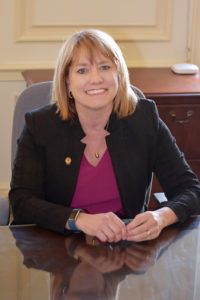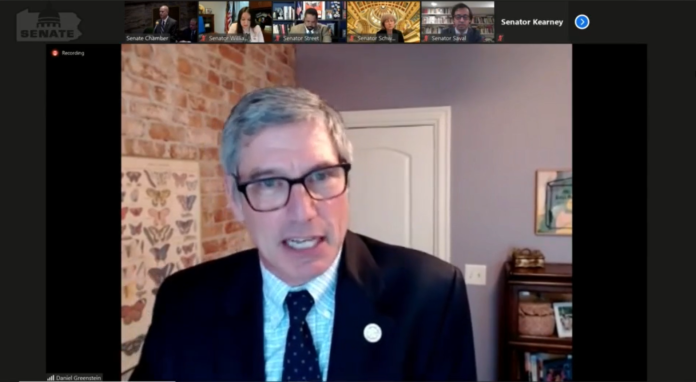The Association of Pennsylvania State College and University Faculties (APSCUF) released a statement Wednesday in response to the Pennsylvania State System of Higher Education (PASSHE) Chancellor Daniel Greenstein’s testimony during the state system’s Senate Appropriations Committee Budget Hearing on March 18.
In an exchange between Sen. Joe Pittman, an Indiana County Republican whose district includes the Indiana University of Pennsylvania, and Greenstein, Pittman said he wondered “what the value add of being part of the state system even is at this point” after discussing finances among PASSHE universities. Greenstein said if issues aren’t resolved, he recommends the dissolution of the state system.
“Unless we figure this out,” Greenstein said, “I will be recommending to the board that we come back to the Senate next year with a legislative package to dissolve the system because if we continue to go down this path, what you’re gonna see is that that cross-subsidization is going to drain all of us. Then, what does that mean for public higher education in this state?”
Greenstein explained later that attendees were talking about potential trajectories of the state system during the two-hour testimony. The way he conveyed the information “left an impression, for some, that dissolving the state system was a preferred course of action,” he said in an emailed statement. He went on to say that “nothing could be farther from the truth.”
“In that same hearing, I reiterated that dismantling the state system, leaving our 14 institutions to fend for themselves, would be a disaster for our students and the communities we serve,” Greenstein said in the statement. “At the same time, an even greater disaster would be to do nothing. That would drain our universities’ collective resources, leaving each of them impaired.”
In a statement released Wednesday, Communications Director Kathryn Morton said APSCUF discussed the harm caused by Chancellor Greenstein’s words in an emergency meeting on Tuesday. Officers expressed their concern for this statement being said during a time when students are enrolling.

Jamie Martin, the APSCUF president, said she was devastated to hear a leader discuss dissolution during recruitment season. She described it as “reckless” and “irresponsible.”
“My jaw literally dropped,” Martin said. “I was stunned. To have any leader of the university system suggest dissolving it or dismantling it is troubling. He should be there advocating for funding, advocating for additional appropriation so that tuition goes down.”
SRU-APSCUF Chapter President Jason Hilton said while the system does need some changes, the chancellor’s choice of words was reckless. He believes most issues in the system are related to “chronic mismanagement” at PASSHE universities.
“Fortunately, [SRU] has been well-managed for years, which is why we do well,” Hilton said. “But a number of the other campuses have not been managed well, and the funding levels from the government have just been lower and lower.”
Hilton said roughly a quarter of the budgets for each sister university comes from the state and student tuition makes up for the rest. He said this is why tuitions and additional costs are so high, and dissolving the system wouldn’t help anything.
The PASSHE system redesign is in its third phase: transforming the governance and leadership structure, according to its website. This includes the integration of Bloomsburg, Lock Haven and Mansfield Universities and the consolidation of California, Clarion and Edinboro Universities. Greenstein said the PASSHE system redesign will “preserve affordable, high-quality education” for each sister university.
The state system’s governing board is expected to make a decision about integrations in April. If approved, a final decision could be made as soon as July. Students would be able to enroll in the integrated universities in August 2022 for the fall semester, according to the PASSHE system redesign webpage.
Hilton said the state system modeled its integrations after consolidations in Georgia. He explained that experts say it didn’t save Georgia any money. He described the redesign as “a distraction from real solutions,” such as creating system-wide services to save money.
“By consolidating certain campuses in the west and northeast, they’re actually missing out on opportunities to do things that actually would result in money savings,” Hilton said. “There’s a lot of back-end services, for instance, human resources. Each campus has [its] own human resources, but if we had a system-wide human resources, that would save a lot of money. If we had system-wide food contracts, that would save money.”
Greenstein has said that the PASSHE system redesign is not about saving money, but rather about growth. David Pidgeon, the director of public relations for PASSHE, said the state system needs to grow to be a viable, affordable higher education option for students.
“What if in addition to creating dynamic in-person, residential educational experiences at California, Clarion and Edinboro [Universities], we also stand up a robust, Pennsylvania-based online option not currently available?” Pidgeon said. “What if as part of the Bloomsburg, Lock Haven and Edinboro integration, we also explore short-burst certificate-based non-degree programs to build skills that employers in the northern region of Pennsylvania are looking for?”
According to Hilton, the state system was originally designed to provide a high-quality education at the lowest cost possible, especially for first-generation college students and students from low-income families. He emphasized that its founding is based on equity and inclusion, with Cheyney University being one of the oldest historically Black colleges in the country.
“If we’re going to be about equity and inclusion, throwing around the notion of dissolving the state system or not funding the state system are totally the opposite of that,” Hilton said. “It’s a direct attack on the one thing that’s actually set up to help those who have less means and those who aren’t historically served by higher education.”








